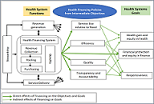Perception Regarding Health Care Financing System and Its Advancement towards Universal Health Coverage in Nigeria among Residents of Awka, Anambra State

Abstract:
The purpose
of this study was to explore the perception regarding the health care financing system and its
advancement towards health coverage in Nigeria among residents of Awka, Anambra
state. An exploratory survey approach was used;
and entailed the collection of both qualitative and quantitative data from 360 participants
using one set of structured questionnaires, which was also used as an interview
guide to collect data from the non-literate respondents. The findings reveal that
majority of the respondents do not have knowledge of what the health care financing
system involves, whether, on generation, allocation, or utilization of funds for
health care, and thus do not agree with whatever the objectives of health
care financing system is in Nigeria. Out-of-pocket
expenditure has been reported as the mechanism commonly used for implementing a
health financing system in Nigeria. There is little or no knowledge regarding the
objective of pooling
resources for health and no knowledge of how the
government secures health services for the populace. Nigeria should develop and implement health financing
policies that ensure contributions from relevant stakeholders aimed at investing
in individuals, families, and communities, ensuring capacity development that will
enable their active and meaningful engagement in health issues. This will thus optimize
their knowledge as advocates for healthy policies, active co-developers of health
and social services, and implementers of these services.
References:
[1] United Nations, (2013).
A new global partnership: eradicate poverty and transform economies through
sustainable development. Report of the High-level Panel of Eminent Persons on
the Post-2015 Development Agenda. New York: United Nations. (http://www.post2015hlp.org/wp-content/uploads/2013/05/.
[2]
Stuckler, D., Feigl, A. B., Basu, S.,
& McKee, M. (2010). The political economy of universal health coverage. Paper
presented at the Background paper for the global symposium on health systems
research. Geneva: World Health Organization.
[3] Wang, G.-X. (2012). A network approach for researching political feasibility of healthcare reform: The case ofuniversal healthcare system in Taiwan. Social Science & Medicine, 75(12), 2337-2344.http://dx.doi.org/10.1016/j.socscimed.2012.09.005.
[4] The World Bank, World Health Organization, (2014). Monitoring progress towards Universal Health Coverage at Country and Global Levels: Framework, Measures and Targets. Geneva: World Health Organization.
[5] World Bank Group (2021a). Population, total - World Bank Data - World Bank Group. Retrieved from https://data.worldbank.org/indicator/SP.POP.TOTL.
[6] World Bank Group (2020). Universal Health Coverage Data Retrieved from http://datatopics.worldbank.org/universal-health-coverage/.
[7] World Bank Group, (2021b). Understanding the Coronavirus (COVID-19) pandemic through data. Retrieved from https://datatopics.worldbank.org/universal-health-coverage/coronavirus/.
[8] Osahon, Enabulele, (March 2020). Achieving Universal Health Coverage in Nigeria: Moving Beyond Annual Celebrations to Concrete Address of the Challenges. 12(1). https://doi.org/10.1002/wmh3.328. https://onlinelibrary.wiley.com/doi/epdf/10.1002/wmh3.328.
[9] Sakha, M. A., Rashidian, A. Bazyar, M., Sari, A. A., Yazdani, S. & Moghadam, A. V., (2017). Health Financing Assessment and Policy Analysis toward Universal Health Coverage: A Systematic Review of Qualitative Research. Global Journal of Health Science; 9(5). DOI: 10.5539/gjhs.v9n5p131.
[10] Olakunde BO. (2012). Public health care financing in Nigeria: Which way forward? Ann Nigerian Med;6(1):4-10. DOI: 10.4103/0331-3131.100199. Retrieved from http://www.anmjournal.com.
[11] Kutzin, J., (2008). Health financing policy: A guide for Decision-makers. Health Financing Policy Paper, Division of Country Health Systems. Geneva: WHO. Retrieved from https://www.who.int/health_financing/documents/financing-policy-euro/en/.
[12] Mirzoev T, and Kane S. (2017). What is health systems responsiveness? Review of existing knowledge and proposed conceptual framework. BMJ Glob Health; 2: e000486. doi:10.1136/bmjgh-2017-000486. Retrieved from https://gh.bmj.com/content/2/4/e000486.
[13] Awosusi, A., Folaranmi, T., and Yates, R., (September,2015). Nigeria's new government and public financing for universal health coverage. The Lancet Global health. 3(9): E514-E515. DOI: https://doi.org/10.1016/S2214-109X(15)00088-1 https://www.thelancet.com/journals/langlo/article/PIIS2214-109X(15)00088-1/fulltext.
[14] Rajan D, Barroy H, Stenberg K. (2016). Budgeting for health. In: Schmets G, Rajan D, Kadandale S, editors. Strategizing national health in the 21st century: a handbook. Geneva: World Health Organization. https://apps.who.int/iris/bitstream/handle/10665/250221/978924154974-chapter8-eng.pdf?sequence=11&ua=1.
[15] Barroy,H., Dale E, Sparkes S, Kutzin J, (2018). Budget matters for universal health coverage: key formulation and classification issues. Geneva: World Health Organization; 2018. Licence: CC BY-NC-SA 3.0 IGO.
[16] WHO, (2016b). Public Financing for Health in Africa: from Abuja to the SDGs. Health Financing toward UHC. WHO/HIS/HGF/Tech.Report/16.2. Geneva: World Health Organization. Retrieved from https://www.who.int/health_financing/documents/public-financing-africa/en/.

